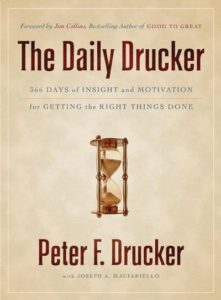One of the handiest books for accessing Peter Drucker’s wisdom is The Daily Drucker, a compendium of material mainly from his earlier books. It was published in late 2004, one year before his death. I reviewed the book for USA TODAY, “Daily management tips by Peter Drucker get the job done,” in which I described it as follows: The short, snappy format will be appreciated by today’s time-challenged business readers: one page with an idea for every day of the year. The pages start with a title, then have a “proverb” that amplifies it, one or two paragraphs to illustrate the lesson and end with an “action point,” in which the reader is challenged to think about the message and do something specific.
I also conducted a brief interview with him as a sidebar to the USA TODAY review, “Drucker’s reinventing himself at age 95.” For instance: Q: You write about reinventing yourself. What are some examples of actions and techniques that people can use in this no-doubt difficult process?
A: I myself always when finishing an assignment or a project, ask WHAT NEEDS TO BE DONE NOW? — and I always end up with a new action program. I don’t find that a DIFFICULT question. The difficult part is the NEXT question: AND WHAT ARE THE PRIORITIES? That takes me quite awhile as a rule, and a lot of agonizing. But it has to be asked and has to be answered.
Here are 16 quotes from the book to help you make the most of your summer:
-
“The ultimate test of an information system is that there are no surprises.” (page 338)
-
“Of the top marketing lessons for the highly competitive twenty-first century, the most crucial one is that buying customers doesn’t work.” (page 225)
-
“The first priority for one’s own development is to strive for excellence.” (page 177)
-
“One cannot manage change. One can only be ahead of it.” (page 69)
-
“Every organization must assume responsibility for its impact on employees, the environment, customers, and whomever and whatever it touches.” (Page 126)
-
“Knowledge workers therefore need to develop, preferably while they are still quite young, a noncompetitive life and community of their own, and some serious outside interest.” (page 287)
-
“The new accounting tools are not just different views of recording transactions but represent different concepts of what business is and what results are.” (page 370)
-
“Predicting the future can only get you in trouble. The task is to manage what is there and to work to create what could and should be.” (page 73)
-
“People change over such a long time span. They become different persons with different needs, different abilities, different perspectives, and, therefore, with a need to “reinvent themselves.”” (page 27)
-
“Any executive who starts out believing that he or she is a good judge of people is going to end up making the worst decisions.” (Page 117)
-
“I’m always asking that question: “What do you want to be remembered for?” It is a question that induces you to renew yourself, because it pushes you to see yourself as a different person—the person you can become.” (page 176)
-
“The most important task of an organization’s leader is to anticipate crisis.” (page 112)
-
“People are a resource and not just a cost.” (page 153)
-
“Management must be built on communications and on individual responsibility.” (page 47)
-
“The first sign of decline of an industry is loss of appeal to qualified, able, and ambitious people.” (page 118)
-
“Information is what holds an organization together and information is what makes individual knowledge workers effective.” (page 397)

